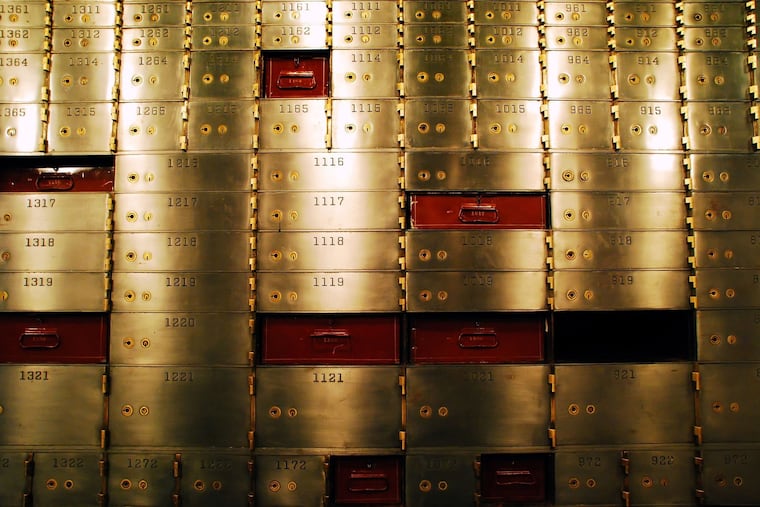Why safe-deposit boxes are becoming harder to find in the Philadelphia area
Many big banks are phasing out the long-standing service, which doesn't make them a lot of money. For some customers, it can feel like a personal loss.

The letter came as a surprise to Linda Dorey-Stein.
It arrived in her Narberth mailbox in August, instructing her to clear out her safe-deposit box in the coming months. Like other big banks, Citizens Bank was phasing out the boxes at her local branch.
In the moment, Dorey-Stein said, it felt like “the end of an era.”
She and her husband first rented a safe-deposit box 40 years ago after Dorey-Stein’s father died and bequeathed his coin collection. The box holds other important items, too, such as the deed to their house, their passports, and even a Mike Schmidt baseball card their now-grown son swore would someday skyrocket in value.
“I had grown up with my father always using a safe-deposit box,” said Dorey-Stein, a 72-year-old retired clinical social worker. She felt like she was “carrying on a family tradition” by storing her valuables at the bank.
But at many big banks, that tradition is coming to an end.
Safe-deposit boxes, once considered a critical banking service, are being phased out at banks across the country, the Wall Street Journal reported in November.
The metal boxes built into vault walls typically hold items that customers “consider valuable, irreplaceable, sentimental, estate-worthy,” essentially “things that they’re afraid to leave at their house,” said David McGuinn, president of Safe Deposit Specialists, which trains banks on safe-deposit-box best practices.
Most box renters are middle-aged or older, he said, and “have acquired wealth, property, savings, [and] estate documents.”
Younger consumers aren’t typically safe-deposit-box customers — yet, he said. They could seek out the service as they get older and build wealth.
Why some big banks are doing away with safe-deposit boxes
Experts and bank executives told the Journal that safe-deposit boxes are less in demand in a world where so much of banking can be done online, with one San Francisco-area customer saying the boxes are “literally going the way of landlines.”
They also aren’t especially profitable for banks, renting for between $25 and a couple hundred dollars a year.
Meanwhile, for the bank executives, “it’s the most expensive square footage you can put into a new branch,” McGuinn said. “This is what the big boys are looking at. They’re like, ‘Why are we doing this?’”
Citizens Bank stopped offering new safe-deposit boxes in 2020, spokesperson Allison Rainsby said, but “we continue to maintain the service for existing safe-deposit box customers in approximately 440 branches across our network, including active locations in Pennsylvania and New Jersey.”
Citizens, which has more than 300 branches in Pennsylvania and New Jersey, did not answer questions about Dorey-Stein’s situation in Narberth.
Santander stopped selling safe-deposit boxes two years ago due to low demand for the service. Wells Fargo still has boxes in the “vast majority” of branches, nationwide and in the Philadelphia area, according to a spokesperson, but the total number of boxes available has decreased due to branch closures.
PNC Bank did not respond to The Inquirer’s requests for comments; The Journal reported that the Pittsburgh-based bank, which has a large market share in Philadelphia, would not be offering safe-deposit boxes at any of the 100 new branches it was opening.
Nationally, JPMorgan Chase, Capital One, HSBC, and Barclays are also reported to be phasing out the service.
If banks discontinue the service, “there’s a market for used safe-deposit boxes,” McGuinn said, so they can make money. But some customers can be left high and dry.
“If you have all of your accounts there, it’s now going to be inconvenient to go somewhere else,” he said. And given the intimate nature of some of the items people store in safe-deposit boxes — McGuinn has seen loved ones’ ashes and babies’ umbilical cords — a closure can feel personal: “It’s almost like, ‘You don’t love me anymore.’”
Where to find safe-deposit boxes
McGuinn, who is based in the Houston area, said he foresees demand for safe-deposit boxes slowing but not grinding to a halt, especially considering the increased demand for gold and silver.
He said credit unions and community banks are getting more interested in adding or expanding the service as the big banks disinvest.
In the Philadelphia area, the Chadds Ford-based Franklin Mint Federal Credit Union does not offer safe-deposit boxes at any of its 17 branches, according to a spokesperson. Other local credit unions didn’t respond to requests for comment, but American Heritage Credit Union, Philadelphia Federal Credit Union, and Police and Fire Federal Credit Union list safe-deposit boxes as a service at at least some branches, according to their websites.
“If you really just shop around in your geographic area, you’re going to find safe-deposit boxes,” McGuinn said.
After receiving the letter from Citizens about her Narberth branch, Dorey-Stein asked neighbors and friends whether they knew of banks that still offered safe-deposit boxes. Many did not, and she said she briefly considered buying a home safe, which run from a couple hundred to a couple thousand dollars, depending on the size and quality.
Finally, she found the TD Bank in Havertown would adopt her safe-deposit box contents. She and her husband could move their items to a midsize box there for about $200 a year, a similar price to what they had been paying for years at Citizens.
So, at least for now, her family tradition can continue.